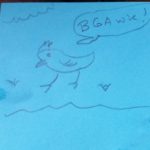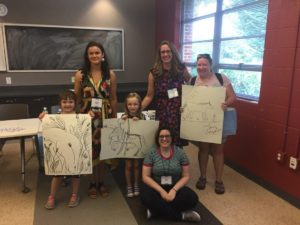I got a “B” in my elementary school art classes. That wouldn’t be a big deal, except that I got A’s in all the other subjects. And yes, it’s weird that I was graded in art. Was everyone back then? My kids don’t get letter grades in art, just a number based on participation. My kids also get to do a wide variety of art projects that allows for different interpretations from each student, very different from my own childhood. Come to think of it, I didn’t even have an art teacher. The same teacher I had all day taught art once a week using a model she’d created of some project we were all supposed to copy. Ah, memories…
My inability to beautifully copy the teacher’s art, and the subsequent “B,” turned me away from art at a very early age. I’ve rarely drawn  anything in the decades since elementary school, except for some chickens I occasionally slip into my daughter’s lunchbox (we have this thing with chickens, it’s a long story). When my debut picture book sold, people asked whether I would be doing the illustrations, and I’m embarrassed to say the same three words kept slipping out of my mouth: “I can’t draw.” It didn’t occur to me, at the time, that I might be doing damage to kids, including my own, who heard me say that.
anything in the decades since elementary school, except for some chickens I occasionally slip into my daughter’s lunchbox (we have this thing with chickens, it’s a long story). When my debut picture book sold, people asked whether I would be doing the illustrations, and I’m embarrassed to say the same three words kept slipping out of my mouth: “I can’t draw.” It didn’t occur to me, at the time, that I might be doing damage to kids, including my own, who heard me say that.
Fast forward to my book’s release this past August and a trip to the Decatur Book Festival, where I appeared on a panel with two awesome author-illustrators, Corinna Luyken and Jessie Sima. The panel moderator suggested in advance that Corinna and Jessie have a “draw-off” of horses (Corinna illustrated my debut, “Adrian Simcox Does NOT Have a Horse,” and Jessie illustrated the recently released “Snow Pony and the Seven Miniature Ponies.”)
I was expected to sit out the contest, but instead, I offered to participate, in part because of the storyline of Corinna’s own debut, “The Book of Mistakes,” which so wonderfully shows how “mistakes” can actually become great sources of inspiration, and that there’s nothing more fun than taking a chance and seeing where your creativity can lead you. What would it say to those kids in the audience if I had said, “I can’t draw,” and sat out?
 I wanted to show that you don’t have to be a professional artist to have fun with art. And it was a lot of fun! And I didn’t cry when none of the kid winners of the trivia contest chose my drawing as the prize. This kind lady was happy to take it, saying, “That’s EXACTLY how I would have drawn it!”
I wanted to show that you don’t have to be a professional artist to have fun with art. And it was a lot of fun! And I didn’t cry when none of the kid winners of the trivia contest chose my drawing as the prize. This kind lady was happy to take it, saying, “That’s EXACTLY how I would have drawn it!”
Back at home, I found a long-forgotten book about how to draw funny animals in the bottom of my daughter’s drawer, and I got it out and started drawing, and I had a ball. And guess what? My kids saw me and started drawing, too, and also had a great time. Yet, I’ve heard my daughter say, just in the past few days, that she’s “terrible” at drawing. A girl in her tween years says she’s terrible at a lot of things, and that’s something we’re working on, but I’ve found that saying, “No, you’re not,” only goes so far.
It’s so much better to lead by your own example, trying and failing, and trying again, taking risks, being willing to look silly in front of people and not caring because you are doing something you enjoy. If I had told myself I was terrible at writing, I would have given up long, long ago. I had more than 300 rejections spread over two adult novels before I found my niche writing for children. I know that “mistakes” in writing can turn out to be gifts. I’ve got a dozen picture book ideas that haven’t gone anywhere on their own but have led to better ideas. I’ve written a book several times only to use those drafts to figure out what it is I really want to say (before throwing the drafts out and starting over). When I hear kids using that self-defeating, I can’t, language, it really bothers me, and I am trying hard to erase it from my own speech. Whether it’s painting, writing, soccer or ballet, we have to start somewhere. We can do it, and we can improve. (And someday I’ll learn to draw a better chicken.)